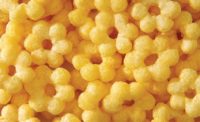Over time, select trends across food emerge, rise to prominence and then grow fully intertwined into the fabric of the industry itself. Such is the case with “better-for-you,” a term that has grown to encompass any product that has some level of nutritional improvement over a “traditional” version of the very same product, often released under the same recognizable brand that made the traditional product famous in the first place. Think a reduced-calorie RTE popcorn product formulated to have fewer calories through fat selection and level than its regular counterpart.
Better-for-you can also relate to a slight variation on a tried-and-true product format—like apple chips versus potato, or integrating purple potatoes and/or beets into a salty snack chip mix.
But better-for-you has also evolved to include a wide range of product characteristics that have more in common with health perceptions than quantifiable nutritional variables like level and type of fat, sodium levels, fortification, etc. These are the “health halos” of natural, organic, non-GMO, clean label and so on.
Snacks are a particularly lively playing field for better-for-you. For snack foods long accustomed to the use of wheat, the introduction of gluten-free opened a new world of grain possibilities that now extend well beyond specialized gluten-free or free-from snacks to bring the label clout of ancient grains to the mainstream. With some investments in new equipment and R&D, baked potato chips offer a nutritional improvement over fried, opening health-focused consumers to the idea of chips again. Extruded puffs and chips are great candidates for introduction of vegetable powders, fiber and protein. A new generation of tortilla chips adds any number of grains and seeds into the mix.
As the chart on this page indicates, these better-for-you products are resonating with the buying public. Sometimes it’s as simple as offering an organic version of a snack, as Annie’s Homegrown has proven. In other cases, it’s bringing a new hybrid product to market, like Nabisco has done with Good Thins, snacks that feature ingredients like sweet potatoes, spinach, chickpeas, bell peppers and more. Some are gluten-free, others have low fat levels. Is it a cracker? Is it a chip?
One thing is for sure, it’s truly better-for-you, it has a clean label and it sells. And that’s good for the industry.




